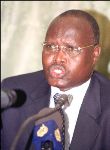Southern Sudan peace process on right track despite Darfur
NAIROBI, June 14 (AFP) — Efforts to steer Khartoum and the former southern rebel group towards a government of national unity are on the right track, despite woes facing the country’s war-ravaged western region of Darfur, the chief player in the peace process said.
 “I truly believe that the peace process is on the right track. Both sides are working very hard to make peace a reality in the Sudan,” Lazaro Sumbeiywo, a retired Kenyan army general who mediated a final peace accord, said in Nairobi.
“I truly believe that the peace process is on the right track. Both sides are working very hard to make peace a reality in the Sudan,” Lazaro Sumbeiywo, a retired Kenyan army general who mediated a final peace accord, said in Nairobi.
Khartoum and the Sudan People’s Liberation Movement/Army (SPLM/A) inked a long-awaited peace accord on January 9, in the Kenyan capital which ended 21 years of fighting that claimed at least 1.5 million people and displaced four million others.
Sumbeiywo warned that the conflict in Darfur, which has raged since February 2003, has diverted the attention from the north-south peace agreement, which is set to be implemented on July 9, six months after the deal was signed.
After a six-year transitional period, the south is scheduled to vote in a referendum whether to secede or remain united with the north.
“The international community has so much focused on the problem in Darfur, yet the problem in southern Sudan is yet to be fully settled,” he told AFP after attending a meeting in Nairobi that launched a film about the war in the country was launched.
“We are saying that as much as you give Darfur attention, the south also needs the international community,” he added.
Under the January 9 accord, the both sides should have formed a government of national unity in Khartoum by July 9, sharing of all arms of government between the Islamic regime in the north and SPLM/A officials.
But up to now, the country’s new constitution, which is to pave the way for the transitional period and for the national unity government, which is expected would up on July 9, is yet to be ratified.
Officials said the delay in its ratification has been occasioned by final details as well as getting all Sudan political groups on board.
“I am still optimistic that both sides can finalize everything on time … there is no reason to give up hope now, but somehow, the most important thing is not the deadlines but achieving the goal of lasting peace,” Sumbeiywo told AFP.
The landmark January accord was the culmination of lengthy negotiations between the two foes that kicked off in earnest in Kenya in early 2002, after numerous false starts since Khartoum and the rebels adopted an agenda for such talks in 1994.
The war in the south erupted in 1983 when the rebels rose up against Khartoum to end Arab and Muslim domination and marginalisation of the black, animist and Christian south.
While religion fuelled the conflict, vast reserves of oil, mostly in southern Sudan, played an increasingly dominant role in Africa’s longest running civil conflict.
In Darfur, a region the size of France, more than two years of civil war that has claimed between 180,000 and 300,000 lives, displaced around 2.4 million and sent more than 200,000 fleeing to neighbouring Chad.
Early this year, donors pledged 4.5 billion dollars to rebuild Sudan, after decades of war, but on Monday, the USAID-funded Famine Early Warning System Network, warned that large parts of southern Sudan face acute food shortage and appealed for help.
Tens of thousands of returnees are also streaming back to the poverty-ravaged region.
